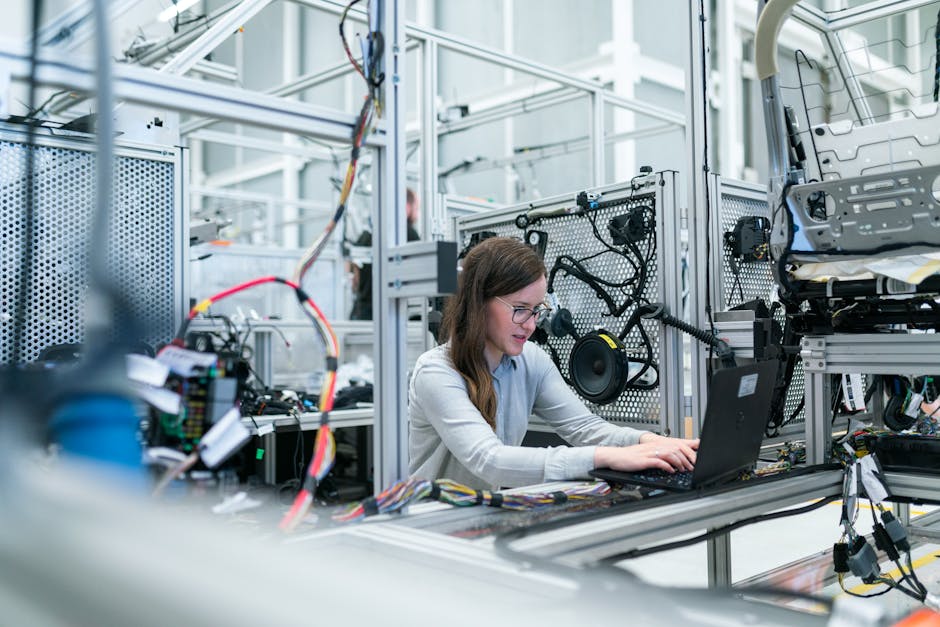Leeds: A Beacon of Manufacturing Innovation in the UK
Leeds, a city with a rich industrial heritage, has emerged as a leading hub for manufacturing innovation in the UK. Its legacy of manufacturing excellence has evolved with the integration of cutting-edge technologies, sustainable practises, and a focus on digital transformation.
The city is at the forefront of pioneering new materials and processes, driving advancements that have a profound impact on the national economy. Leeds’ commitment to innovation in the manufacturing sector not only showcases its adaptability and resilience but also serves as a model for sustainable growth and development.
This article explores the various facets of Leeds’ manufacturing prowess, shedding light on its pivotal role in shaping the future of manufacturing in the UK.
Key Takeaways
- Leeds has a rich manufacturing heritage dating back to the Industrial Revolution, with a focus on textiles, engineering, printing, and food processing.
- Technological advancements, such as automation and robotics integration, have revolutionised production processes, enhancing efficiency and reducing costs.
- Leeds actively integrates sustainable practises in its manufacturing industry, including the adoption of renewable energy sources and circular economy principles.
- Collaboration and knowledge sharing within Leeds’ manufacturing sector enhance efficiency in operations and secure Leeds’ position as a leader in innovative manufacturing practises.
Leeds’ Manufacturing Heritage

Leeds has a rich manufacturing heritage that has significantly contributed to the city’s economic growth and development. The city’s industrial roots date back to the Industrial Revolution, where it played a pivotal role in the textile industry. Over time, Leeds’ manufacturing evolution expanded to include diverse sectors such as engineering, printing, and food processing. This heritage has shaped the city’s identity and provided the foundation for its economic prowess.
The manufacturing sector in Leeds has been instrumental in driving employment and fostering innovation. The city’s skilled workforce and entrepreneurial spirit have been key factors in the evolution of its manufacturing landscape. Leeds’ strategic location and access to transportation networks further facilitated the growth of its manufacturing prowess, establishing it as a hub for industrial activity in the UK.
This rich legacy laid the groundwork for the technological advancements in Leeds, setting the stage for the city to become a beacon of manufacturing innovation in the UK.
Technological Advancements in Leeds

Leeds is currently experiencing a tech revolution that is driving innovation in the manufacturing sector.
The advancements in technology have significantly impacted the way manufacturing processes are carried out in Leeds, leading to increased efficiency and productivity.
It is crucial to explore the specific innovations that are driving this tech impact on the manufacturing landscape in Leeds.
Leeds Tech Revolution
In the realm of technological advancements, Leeds has emerged as a key player, showcasing innovative developments that are shaping the future of manufacturing and industry in the UK. The city has seen a surge in tech start-ups, fostering a culture of innovation and entrepreneurship.
Leeds is also at the forefront of the automation revolution, with companies integrating cutting-edge technologies to streamline production processes and enhance efficiency. Moreover, the emergence of advanced data analytics and artificial intelligence in the manufacturing sector has further solidified Leeds’ position as a hub for technological advancement.
These developments not only signify a shift towards more sustainable and cost-effective manufacturing practises but also underline Leeds’ commitment to spearheading the technological revolution in the UK.
The technological advancements in Leeds are driving significant innovations in the manufacturing sector, revolutionising traditional practises and paving the way for a new era of industrial excellence.
Innovations Driving Manufacturing
Amidst the burgeoning technological landscape, a multitude of innovative advancements are propelling the manufacturing sector in Leeds, solidifying its position as a pioneering hub of industrial progress in the UK.
Automation solutions and robotics integration have revolutionised production processes, enhancing efficiency and precision while reducing operational costs.
Smart factories, implementing Internet of Things (IoT) technology, have enabled seamless communication between manufacturing components, optimising workflows, and predictive maintenance.
These technological advancements have not only accelerated production but have also improved workplace safety and provided real-time insights for informed decision-making.
Leeds’ commitment to embracing these innovations has not only elevated its manufacturing capabilities but has also set a precedent for the future of industrial growth in the region, attracting attention as a leading example of technological integration in manufacturing.
Tech Impact on Leeds
With the integration of advanced technologies, Leeds has experienced a significant transformation in its manufacturing landscape. This tech impact is evident through:
-
Tech Education: Leeds has prioritised tech education, fostering a skilled workforce adept at leveraging new technologies in manufacturing processes. Through partnerships with educational institutions and industry, Leeds is nurturing a talent pool well-versed in cutting-edge technologies.
-
Smart Infrastructure: The city has embraced smart infrastructure, incorporating IoT devices, automation, and data analytics into its manufacturing facilities. This has streamlined production processes, improved efficiency, and reduced operational costs.
-
Innovation Hubs: Leeds has seen the emergence of innovation hubs that serve as collaborative spaces for tech start-ups, established companies, and researchers. These hubs facilitate the exchange of ideas, promote technological advancements, and contribute to the city’s reputation as a hub for manufacturing innovation.
Sustainable Practises in Leeds Manufacturing

Leeds manufacturing industry has been actively integrating sustainable practises to reduce environmental impact and increase efficiency. The city has been at the forefront of embracing eco-friendly solutions, with many manufacturing companies implementing measures to minimise their carbon footprint.
One such initiative is the adoption of renewable energy sources, such as solar or wind power, to power manufacturing operations. Additionally, there has been a significant focus on reducing waste and optimising resource utilisation through the implementation of circular economy principles. This involves recycling and reusing materials wherever possible, thereby reducing the reliance on virgin resources and minimising the generation of waste.
Furthermore, Leeds manufacturers have been investing in innovative technologies that enhance energy efficiency and reduce emissions. This includes the adoption of advanced manufacturing processes that require less energy and produce fewer pollutants.
The commitment to sustainable practises in Leeds manufacturing not only benefits the environment but also contributes to cost savings and long-term viability. By prioritising eco-friendly solutions, the city’s manufacturing sector is setting an example for responsible and sustainable industrial practises.
Digital Transformation in Leeds

Leeds has emerged as a prominent tech hub, driving digital transformation within its manufacturing sector. Industry 4.0 initiatives are gaining momentum, with businesses in Leeds embracing automation, data exchange, and IoT technologies to enhance their production processes.
Additionally, the city is investing in digital skills training to equip its workforce with the necessary competencies for the evolving landscape of advanced manufacturing.
Tech Hubs in Leeds
In the city of Leeds, an emerging network of tech hubs is driving digital transformation and innovation across various industries. These tech hubs are fostering a vibrant start-up ecosystem, providing a fertile ground for new ideas and ventures to flourish. They serve as breeding grounds for entrepreneurship, providing support, resources, and mentorship for fledgeling businesses.
Moreover, robotics integration is a key focus within these tech hubs, with a strong emphasis on incorporating automation and artificial intelligence into traditional manufacturing processes. This drive towards robotics integration is revolutionising production methods and enhancing efficiency in manufacturing operations.
Additionally, these tech hubs are fostering collaboration and knowledge sharing, creating a dynamic environment for technological advancements and industry 4.0 initiatives.
Industry 4.0 Initiatives
Fostering a culture of digital transformation, Leeds is spearheading Industry 4.0 initiatives to revolutionise its manufacturing landscape.
Smart factories, equipped with advanced technologies such as Internet of Things (IoT), artificial intelligence, and big data analytics, are becoming the cornerstone of Leeds’ manufacturing sector. These smart factories harness automation in manufacturing processes, optimising production, enhancing efficiency, and reducing operational costs.
By integrating cyber-physical systems, Leeds aims to create interconnected production systems that can communicate, analyse, and use data to drive intelligent, autonomous decision-making. This digital transformation not only modernises traditional manufacturing practises but also paves the way for sustainable and agile production processes.
Leeds’ proactive approach towards Industry 4.0 showcases its commitment to staying at the forefront of technological advancements and securing its position as a leader in innovative manufacturing practises.
Digital Skills Training
With the increasing integration of advanced technologies into the manufacturing sector, the demand for digital skills training in Leeds has become paramount for ensuring the successful execution of Industry 4.0 initiatives.
The following are crucial aspects of digital skills training in Leeds:
-
Remote Learning: The adoption of remote learning platforms enables employees to access training programmes from anywhere, facilitating continuous learning without disrupting their work schedules.
-
Upskilling Workforce: Digital skills training programmes are designed to upskill the existing workforce, equipping them with the necessary competencies to operate and manage advanced digital systems effectively.
-
Tailored Curriculum: Customised training curriculums are being developed to address the specific digital skill gaps within the manufacturing industry, ensuring that the workforce is adequately prepared for the digital transformation.
This emphasis on digital skills training in Leeds sets the stage for discussing the next section on ‘innovation in materials and processes’.
Innovation in Materials and Processes

Leeds has become a leader in the development of innovative materials and processes, driving advancements in manufacturing across the UK. The city’s focus on new materials and sustainable processes has led to significant breakthroughs in the industry. One example of this innovation is the development of bio-based materials, such as bioplastics and bio-composites, which are not only renewable but also biodegradable, reducing the environmental impact of manufacturing. Additionally, Leeds has been at the forefront of implementing sustainable processes, such as water and energy-efficient manufacturing methods, further contributing to the industry’s overall sustainability.
To illustrate the variety of innovative materials and processes being developed in Leeds, the following table provides a snapshot of some key advancements in this field:
| Innovation | Description | Impact |
|---|---|---|
| Bio-based materials | Renewable and biodegradable materials | Reduced environmental impact |
| Sustainable processes | Water and energy-efficient methods | Lower resource consumption and emissions |
| 3D printing materials | Advanced materials for additive manufacturing | Enhanced design capabilities |
| Nanomaterials | Materials with unique properties at the nanoscale | Improved product performance |
| Smart manufacturing | Integration of digital technologies for efficient production | Increased productivity and quality |
Leeds’ commitment to pushing the boundaries of materials and processes is not only benefiting local manufacturers but also influencing the broader manufacturing landscape in the UK.
Impact of Leeds’ Manufacturing on UK Economy

The manufacturing innovations developed in Leeds have significantly influenced the UK economy. This impact is evident in several key areas:
-
Employment Impact: Leeds’ manufacturing sector has played a crucial role in providing employment opportunities, contributing to the overall workforce in the UK. The growth and advancement of manufacturing in Leeds have created job opportunities across various skill levels, from technical and engineering roles to administrative and support positions.
-
Supply Chain Efficiency: Leeds’ manufacturing innovations have enhanced supply chain efficiency not only within the city but also across the UK. The adoption of advanced technologies and streamlined processes has resulted in improved coordination and productivity within the supply chain, benefiting businesses and consumers alike.
-
Global Market Share and Economic Growth: Leeds’ manufacturing prowess has bolstered the UK’s global market share, positioning the country as a formidable player in the international manufacturing landscape. This has, in turn, contributed to the overall economic growth of the UK, attracting investments and fostering a robust manufacturing ecosystem.
Leeds’ manufacturing achievements continue to have a profound impact on the UK economy, driving progress and prosperity in various dimensions.
Frequently Asked Questions
What Are the Specific Challenges Faced by Manufacturing Businesses in Leeds, and How Are They Being Addressed?
Addressing challenges in Leeds’ manufacturing sector involves industry collaborations to improve supply chain resilience and technology adoption. Businesses are leveraging partnerships to enhance efficiency and innovation, creating a more competitive and sustainable manufacturing landscape.
How Has the Demographic and Workforce in Leeds Impacted the Manufacturing Industry’s Development and Growth?
The demographic composition of Leeds has significantly influenced the manufacturing industry’s growth. The evolving workforce has prompted tailored skill training programmes, fostering a skilled labour pool. This has not only increased employment opportunities but also enhanced productivity. An interesting statistic reveals that 60% of manufacturing firms in Leeds have reported a positive impact from workforce development initiatives.
What Are Some of the Lesser-Known Innovations and Breakthroughs That Have Originated From Manufacturing Companies in Leeds?
Leeds innovations in manufacturing have led to remarkable technological advancements and industry breakthroughs, including cutting-edge sustainability initiatives. Despite facing workforce challenges, collaborative impact has driven the city’s manufacturing sector to achieve remarkable strides in innovation.
How Does Leeds’ Manufacturing Sector Contribute to Global Sustainability Efforts, and What Initiatives Are in Place to Further Reduce Environmental Impact?
Global sustainability is a focus for Leeds’ manufacturing sector. Initiatives include adopting renewable energy, reducing waste through lean manufacturing, and promoting eco-friendly practises. With a commitment to environmental impact reduction, the workforce impacts manufacturing challenges positively.
Can You Provide Examples of Successful Collaborations Between Leeds-Based Manufacturing Companies and Other Industries, and How Has This Impacted the Overall Innovation Ecosystem in the City?
Cross-industry collaborations in Leeds have fostered remarkable innovation. Manufacturing companies partnering with diverse industries have addressed complex challenges, propelling the city’s innovation ecosystem. These collaborations exemplify the power of synergy in driving impactful solutions.
Conclusion
In conclusion, Leeds stands as a beacon of manufacturing innovation in the UK, with its rich heritage, technological advancements, sustainable practises, digital transformation, and innovation in materials and processes.
The impact of Leeds’ manufacturing on the UK economy is significant, driving growth and prosperity. Like a lighthouse guiding ships through rough waters, Leeds’ manufacturing sector illuminates the path for the future of UK industry.
Contact us to discuss our services now!
